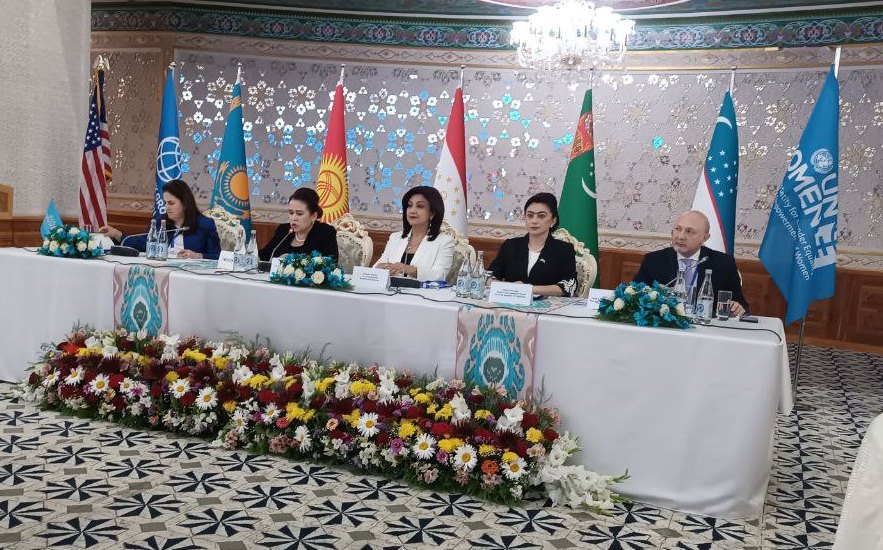 Photo: Asia-Plus
Photo: Asia-PlusThe International Pre-Conference Forum “Women and Water” was held in Dushanbe at Kokhi Navruz on June 10, where the important role and achievements of women in managing water resources and ensuring gender equality in access to them were discussed.
The event was held as part of the third high-level international conference on the international decade of action “Water for Sustainable Development, 2018-2028”.
The forum was organized under the coordination of the Committee on Women and Family Affairs under the Government of Tajikistan and UN Women in Tajikistan in cooperation with the United States Agency for International Development (USAID), the Asian Development Bank (ADB), the UN Regional Center for Preventive Diplomacy for Central Asia (UNRCCA), Institute for War and Peace Reporting (IWPR), Agency for Technical Cooperation and Development (ACTED), United Nations Population Fund (UNFPA), World Bank (WB) and Organization for Security and Cooperation in Europe (OSCE).

The event brought together representatives from 27 countries – employees of international organizations, politicians, scientists, heads of various government agencies, public activists, journalists, etc.
The forum was an important step towards achieving the sixth sustainable development goal and an international platform for discussing the role of women in water resources management, ensuring gender equality in the field of water relations, progress and results achieved by women in water resources management, access to them, problems and opportunities in this area.
Participants also tried to find solutions to water problems, developed recommendations to strengthen the role of women in the water sector, and established new partnerships between stakeholders.
In many traditional societies, it is women who bear the burden and responsibility of providing water for the family. Therefore, the inclusion of women in decision-making processes on water resources is very important, experts say. But the statistics are still disappointing.
“Women face numerous barriers and restrictions in the water sector,” said Sameh Wahba, World Bank Regional Director for Sustainable Development for Europe and Central Asia. “Although we say that we have many water institutions that work specifically with a gender perspective, there are still not enough women in this sector.”

According to the World Bank, currently less than 20% of women in the water sector in the Central Asian region are women, and only 3% of licensed engineers and managers are women.
“22% of enterprises in the water sector have no female engineers at all, and 12% have no female managers,” noted Sameh Wahba.
According to the forum participants, it is experts who should raise and promote the issue of women’s participation in the water problem, direct them to this sector, and promote them to leadership positions. And for this, according to ACTED regional gender specialist in Canada Rano Mansurova, it is necessary to give a correct gender assessment of the situation.

“First of all, it is necessary to understand what the problem is, where the root of gender inequality lies and why this happens in society. This will allow us to formulate our impact so as not to fight the symptoms, but to eradicate the problem itself and effectively solve problems,” said Rano Mansurova.
Participants also noted the importance of the forum in drawing attention to gender issues in access to water resources, women’s participation in water sector management and strengthening their leadership skills.
“Today’s dialogue, which has brought together such a wide range of high-level politicians, scientists and specialists, representatives of civil society and development partners, is in itself an important step towards the implementation of commitments,” First Deputy Minister of Agriculture of Tajikistan Nigina Anvari said at the forum.
In her opinion, the created platform has become a key platform for dialogue and exchange of experience on issues of empowering women in managing or influencing water resources.
Experts suggested that the final decisions of the forum should take into account gender issues in water resource management, involve children in environmental issues, and increase the number of licensed women specialists in the water sector. It is also proposed to create a platform for networking problem solving and exchange of experience between women involved in the issue of transboundary water resources management.

